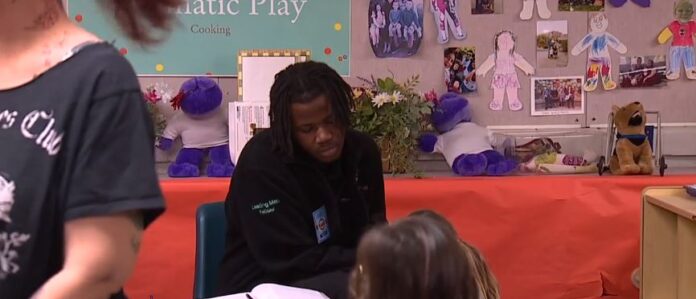
MESA, Arizona (WMAR) — The number of Black men teaching is very low in Arizona and across the country. However, one national organization is hoping to help change that.
For four days a week at Hughes Elementary in Mesa, Shon Pearce is helping pre-kindergarten students read and write. He works as a tutor alongside the lead teachers in the classroom, hoping to help improve kids’ literacy skills.
He also wants to help those who may look like him know that they’re there. Pearce is part of The Leading Men Fellowship, a program part of the organization The Literacy Lab to help increase the number of Black and Hispanic teachers in early education while also helping students.
“I always wondered when I was younger, how teachers felt seeing their kids progress… It feels good. It makes me want to come to work. I don’t feel like this is a job. I’m coming out to hang out with some of my small friends, help them become people,” Pearce told ABC15.
Pearce said he met his first Black male teacher in middle school.
“When I first saw that, it kind of threw me for a loop, because I was like, I’ve never had a male teacher and a Black teacher,” he said.
According to data from the Arizona Department of Education, only a quarter of teachers this school year are men. The number of Black and Hispanic teachers is even fewer with only 17% Hispanic and almost 4% African American.
Research shows that an increase in diversity in the classroom also helps kids. The Institute of Education Sciences says Black students achieved better when they had diverse teachers as well.
Hughes Elementary School Principal Rebecca Ramirez tells ABC15 that her students are more excited to have fellows like Pearce in their classrooms. When the organization came by to see if they could partner with the district and school, she welcomed it.
“I said sign me up because we have very few in our schools,” she said of Black and Hispanic men in their early childhood classrooms.
There are three goals for the Literacy Lab with the program: create opportunities for young men, diversify the teaching pipeline, and increase Kindergarten readiness.
“By us starting now with Pre-K, we can eventually increase our graduation scores and see more progress into post-secondary education,” said Navarro Whitaker, the Literacy Lab program manager for Arizona.
Not only are the kids getting help, but the fellows are also getting more education through the organization. Every Wednesday, they also have learning opportunities to help them further their knowledge in a number of topics including finances and health and wellness.
“I feel like that’s a large part as well of the literacy lab. We’re not only enriching our children, but we ourselves are also learning,” Pearce said.
Students in the fellowship are generally younger men from ages 18 to 24. They’re in the program for two years and do get paid. While they don’t necessarily need to stay in the education path after the fellowship, Whitaker says they hope they do, adding that 80% of their fellows from last year stayed in education while it looks like 70% of their fellows for this school year will be staying in education.
“I’ve never heard of anything like this program before I came here, as far as a specific program for young Black and Brown men, introduced to an education system is unheard of where I’m from. It made me happy that there’s something going on like this,” Pearce said. “It was really breathtaking to see that this is actually a program that’s happening.”
The-CNN-Wire

